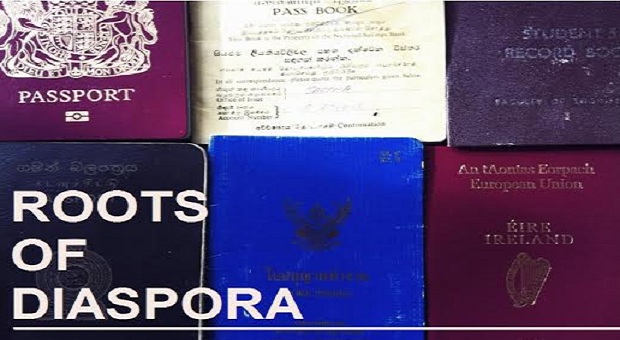Suthamie’s husband fled Jaffna in April 1984. He had arrived in West Germany as a refugee while she was forced to stay back in war torn Jaffna. Suthamie couldn’t accompany him since she was in her sixth months of pregnancy. The doctor had prohibited her from boarding a plane. Despite his wife’s condition it was too dangerous for her husband to stay as a young Tamil man in the North. He left months before seeing his second child’s birth. She was 24 years old when she decided to follow her husband’s footsteps to safety.
Her oldest son was 2 years and 4 days old, her youngest 5 months old when she boarded the night coach from Jaffna to Colombo at 8 PM on November 7, 1984. Her childhood friends and husband’s family helped her carry her nine bags and two children to the bus. Five of her nine bags were filled with nothing but baby food, orange juice and vitamin drops. She packed her newlywed saris and children clothes into the remaining luggage. Her husband had sent a parcel full of winter clothes for her and the children for an arrival in a cold they had never felt before. A life they tried to be prepared for. Her husband’s friend had bought her tickets to West Germany days before. To leave the island by air she had to reach the capital city in the South though. The night bus to Colombo was filled with Tamils who were about to flee the country. Amongst the passenger was a family she knew from Manipay who, as she found out in the bus, were on their way to West Germany as well. They were booked on the same outbound flight.
When the coach arrived at 6 AM in Colombo she was picked up by her husband’s uncle. Colombo was a strangely familiar place she had been to as a child to visit her two sisters and their families. Her sisters, however, returned on board a cargo ship to Jaffna as refugees a year before fleeing the anti-Tamil pogroms that struck much of the capital. Suthamie intended to never return there again. She was eventually left with no choice. Her Aeroflot flight was scheduled for 7 PM the next evening from Katunayake Airport, the only international airport left in the country. The post-pogrom fear was widespread amongst Tamils, including the young Tamil mother. She felt unease in Colombo and wanted to leave right away. Suthamie’s journey to safety was, however, not finalized yet. Her youngest son’s name had not been endorsed in her passport after she gave birth in June. Sri Lanka had only one passport office located in Colombo at the time and Suthamie had little choice but to go to the office in the early morning to sort her administrative issue. At the office, she handed her Sri Lankan passport and her youngest son’s birth certificate to the clerk at the counter the next morning. Suthamie was served by an elder Sinhalese man who didn’t stop looking at her suspiciously. He read her Tamil name, saw her pottu and kunkumum strip and felt displeased. He suddenly threw her passport away and told her to come tomorrow instead. Suthamie was enraged and emotional about the arbitrary and racist behaviour of the man. She insisted she had a flight to catch this evening but the Sinhalese clerk knew no mercy. The young woman was desperate and in tears when her husband’s uncle’s told her that he has a Sinhalese friend who worked as the chief of the passport office. With little hope in sight she told the clerk to return her passport and made her way with her husband’s uncle’s to his friend’s office in the upper floor.
The chief officer of the passport office was another Sinhalese man the young Tamil woman had to face. She was unsure if today was the day she would leave Sri Lanka or return to Jaffna. She articulated her story word after word in her exhausted voice, telling him about her journey and the need to reunite with her husband. She never mentioned to him that she was fleeing, that she was seeking refuge, that she was scared of the state and Sinhalese people. No one explicitly mentioned that they were fleeing Sri Lanka. It was an unsaid message. The word ‘akathi’ (refugee) never passed her lips. All she said was they were travelling, that she was leaving or joining her husband. As if a return was still in sight and an actual possibility. As if their departure was temporary and as if the war was soon to be over. As if she was never to become an ‘akathi’. When Suthamie complained about the racist treatment she received from the clerk to his superior, the chief subsequently ordered his assistant to get the clerk to come up to the office. Once he arrived, the chief asked him in English how long it would possibly take him to write the baby’s name into the mother’s passport? Would that take more than 24 hours, he asked. The clerk didn’t say a word. He was forced to endorse her son’s name in front of his eyes. The chief wished Suthamie a safe journey before he returned her passport around noon. She couldn’t believe her luck.
At 5 PM she was already at Katunayake Airport. Her luggage was checked in at the Aeroflot counter. She chose to fly with the Soviet carrier as it was the cheapest airline to leave the island with at the time. Her ticket and those of her children cost 27000 Rs. When she checked her bags in she was asked to disclose all her valuable items. Tamils were allowed to take no more than 50 US Dollars as traveller’s check out of the country. As she was accompanied by two small children, she was allowed to take some extra cash with her nonetheless. Once she passed the security check, she felt lost in the boarding area with her five handbags and her two children. A number of young Tamil men her age, who she referred to as boys, approached her and asked if they could lend her a hand. The young men were also about to embark to Moscow they told her. Suthamie couldn’t carry the weight of five bags and two children and decided to let the men help her and take care of her eldest. She had no choice but to trust them. The group of men from there on followed the young Tamil woman like a caravan all the way to Moscow. Wrapped in a sari she finally boarded the Tupolev plane into the cold.
The plane was filled with a large number of Tamils who were leaving Sri Lanka. There were also few tanned German tourists squeezed amongst the new refugees. Suthamie couldn’t eat on board as she was busy feeding her children. When it was her turn to eat, her youngest wouldn’t stop crying. The stewardess couldn’t understand her desperate pleas in English and were hence unable to provide her with what she needed to calm her child. Her baby’s screams continued till Moscow. She was restless when the Aeroflot machine from Colombo finally landed at Vnukovo Airport in Moscow. On arrival they were told by the local staff that their connection flight to East Berlin was delayed by 15 hours due to severe weather conditions in the Soviet Union. The airport staff made sure to accommodate the stranded passengers from Sri Lanka by serving them with bread, grilled chicken and juice. Her fellow Tamil passengers sat on the cold airport floor and started to eat the foreign food with their hands. Suthamie didn’t want to eat anything despite being exhausted. A stewardess then told her that she could stay upstairs in a hotel with the children instead. Suthamie, however, was scared that she would be forgotten in the hotel room and would miss her connection flight. She refused the offer and stayed in the terminal without lunch or dinner.
She was the youngest Tamil woman amongst a largely male crowd accompanied by very young children. Her presence was unusual if not outstanding amongst the passengers. The few white tourists took notice of her and approached her afterwards to tell her to take a rest. The only familiar face in the crowd remained the family from Manipay who accompanied Suthamie in her journey to Moscow. They stayed close to her in the terminal while the German tourists held onto her children when she changed their baby clothes. She eventually changed her own clothes from her sari into jeans. The young woman simply felt too cold and uncomfortable travelling further in South Asian clothes. When her eldest son eventually fell asleep in the arms of a German tourist, she could carry her youngest to sleep and rest. His voice silenced slowly. Suthamie remained sleepless throughout.
Her flight to Schöneberg Airport departed on time after a 15 hour delay the next morning. On arrival in East Berlin she paid 2 US Dollars to receive a 24 hour visa for the Soviet controlled zone of the city. None of the refugees really knew what they were doing, where they were going. The mass of Tamil refugees just followed one another in the belief that someone must have a plan. The Tamil men who helped her from Colombo onwards continued to carry her luggage and her children. While the boys were heavily scrutinized by the East German border guards at the airport, she was let go because of her children. In the November cold of divided Berlin they moved like a slow chain of brown people in a white landscape wearing clothes that didn’t suit the climate towards the transit train that was to take them to the Western part of the city. During the train ride the boys asked her, “Acca, can your husband help us?” All of them were desperate for help. Suthamie was convinced her husband could be of help them. She expected her husband to wait for her at the station platform of Berlin Bahnhof Zoo (main station) in West Berlin. Once she arrived, she realized he wasn’t there.
Follow Suthamie’s full journey and more here: https://www.facebook.com/RootsofDiaspora
Roots of Diaspora is an interactive project on refugeehood and migration which aims to collect personal and family stories of flight and immigration of Tamils from Sri Lanka dating back as far as the island’s independence in 1948. The aim of this narrative and visual project is to map journeys of Tamils to provide visual understandings and contexts for migrations, as well as remember and value the travellers, refugees and migrants alike, their journeys, its borders and geographies.
For submissions, contributions and enquiries contact us under: rootsofdiaspora@gmail.com

 Sinthujan Varatharajah
Sinthujan Varatharajah





